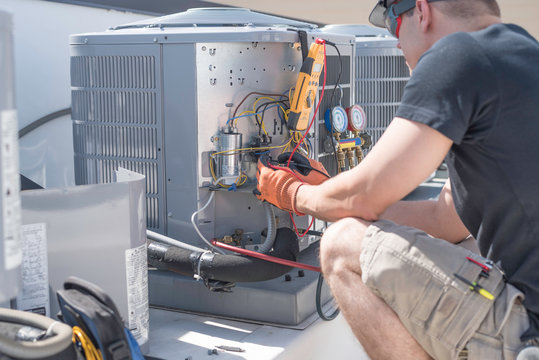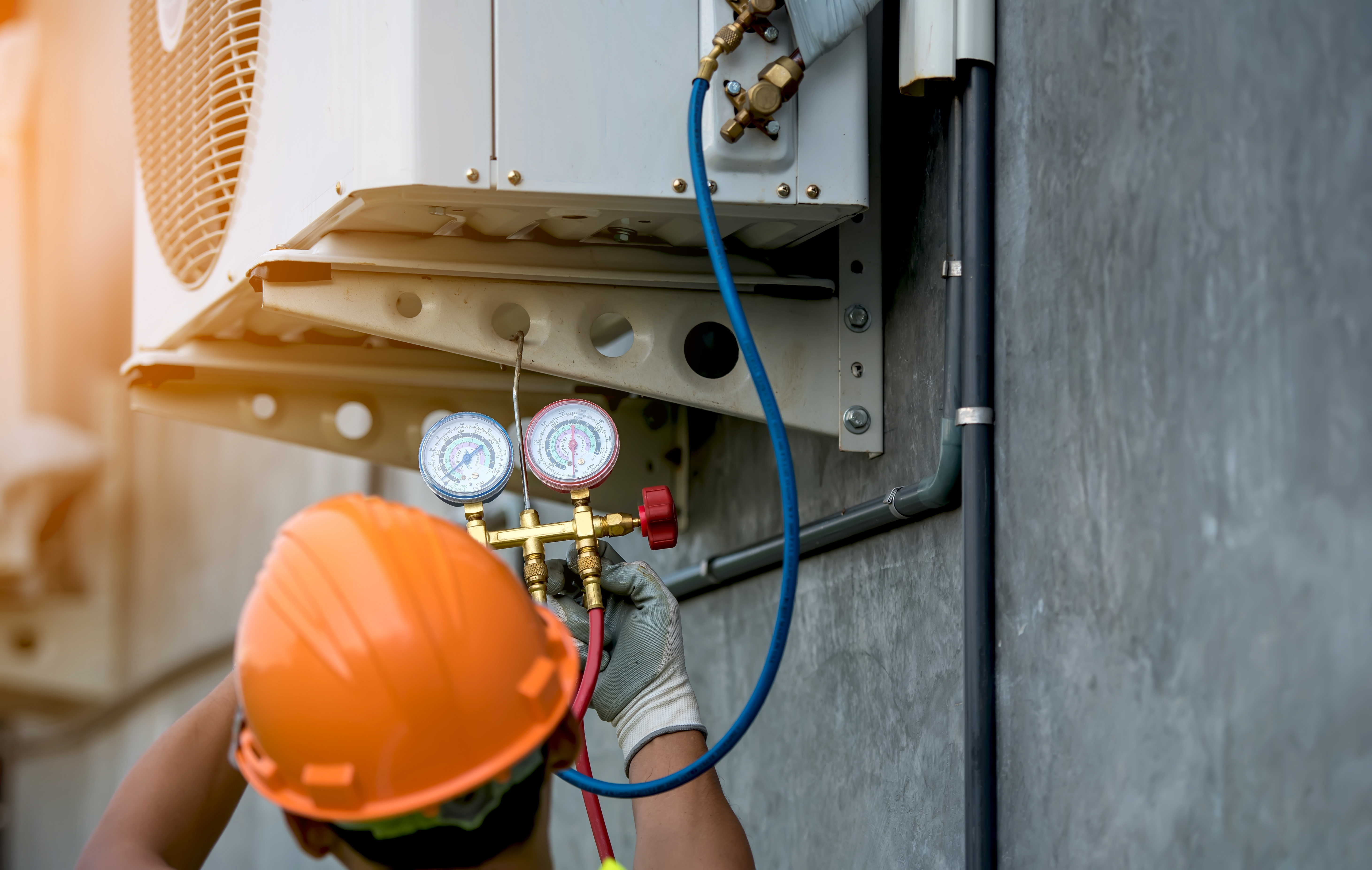HVAC company vs independent tech: pros and cons explained
Wiki Article
Everything about Cooling And Heating: Identifying Common Issues and Effective AC Fixing Approaches
Cooling and heating systems are essential for keeping indoor comfort. Understanding their parts and capability is necessary for determining typical issues. Homeowners often encounter issues such as ineffective air conditioning, weird smells, or rising power prices. These indicators can show underlying problems that may call for interest. Exploring do it yourself troubleshooting methods can be advantageous, but recognizing when to seek professional assistance is equally vital. What actions can be taken to assure lasting efficiency?Comprehending Your HVAC System: Elements and Performance
A heating and cooling system, usually considered the foundation of indoor environment control, consists of a number of key elements that work together to manage temperature and air top quality. The primary aspects include the heating device, ventilation system, and a/c system. The home heating device, usually a heater or boiler, generates heat during chillier months, while the air conditioning unit cools down indoor spaces during the summer season.
Typical Heating And Cooling Troubles House Owners Experience
House owners frequently encounter a number of usual heating and cooling troubles, including irregular temperature circulation throughout their space. Furthermore, uncommon noises throughout operation can suggest underlying issues that need focus. Dealing with these problems quickly is crucial for maintaining suitable system performance.Inconsistent Temperature Level Circulation
Numerous families experience the frustrating problem of irregular temperature level distribution, where specific spaces really feel uncomfortably warm while others stay also cold. This problem commonly emerges from a variety of elements, consisting of inadequate insulation, blocked vents, or a poorly sized HVAC system. When ducts are not effectively secured or when furniture obstructs airflow, some spaces may get not enough air conditioning. Additionally, thermostat placement can significantly affect temperature guideline; a thermostat situated in a sunlit location might misrepresent the total temperature of the house. Regular maintenance, including cleaning filters and making sure ductwork is clear, can assist minimize these disparities. House owners may also take into consideration zoning systems to far better control temperature levels throughout different areas of the home, advertising a much more comfy living environment.Unusual Noises During Operation
When a HVAC system operates, unusual noises can suggest underlying issues that call for focus. Homeowners might run into a variety of sounds, such as grinding, squeaking, or hissing. Grinding noises often indicate damaged bearings or components, while squealing can suggest loosened belts or parts needing lubrication. Hissing may suggest a refrigerant leakage, which can jeopardize the system's performance. In addition, banging audios might direct to loose ductwork or an issue with the blower follower. Each of these noises serves as a warning, motivating home owners to check out even more. Ignoring these indicators can cause more substantial issues and costly fixings. Routine maintenance and timely attention to uncommon noises can boost system durability and efficiency, making sure a comfortable living atmosphere.Signs That Indicate Your Air Conditioner Requirements Repair
Just how can one tell if their cooling unit is in demand of repair work? Numerous signs might indicate underlying problems requiring expert focus. First, if the air conditioner stops working to cool down the space successfully, it may suggest a cooling agent leak or compressor malfunction. In addition, an increase in power bills without matching usage modifications can signify inefficiency in the system. House owners need to also be alert to uncommon scents emanating from the unit, which might suggest mold and mildew development or electrical issues. Additionally, if the air conditioner frequently cycles on and off, it may be an indication of a malfunctioning thermostat or various other mechanical troubles. Finally, the presence of water pooling around the unit can indicate a blocked drain line. Identifying these indicators early can conserve time and cash, making certain that the cooling system runs successfully and effectively.Do It Yourself Troubleshooting Techniques for HVAC Issues
When encountering cooling and heating issues, homeowners can use numerous do it yourself repairing strategies to recognize the trouble. Secret techniques include checking thermostat settings, inspecting air filters, and evaluating drainage concerns. These actions can aid identify typical malfunctions before looking for specialist assistance.Examining Thermostat Setups
What actions should house owners take to guarantee their thermostat settings are correct? Initially, they need to verify the thermostat is established to the preferred temperature and setting, whether home heating or cooling. Looking for a clear screen and confirming the thermostat is not established to "hold" or "vacation" setting is vital. House owners ought to likewise confirm that the thermostat is degree and set up in a location devoid of drafts, direct sunlight, or various other temperature influences. Furthermore, altering the thermostat can assist give precise analyses. If the thermostat operates on batteries, changing them may solve any kind of problems. By systematically reviewing these factors, house owners can frequently identify and correct thermostat-related troubles, advertising optimal heating and cooling system performance.Inspecting Air Filters
Air filters play a crucial role in keeping suitable heating and cooling performance. They catch dust, irritants, and various other bits, making certain clean air circulation. Gradually, filters can become blocked, decreasing air movement and effectiveness. To evaluate air filters, people ought to first find the filter, usually found in the return air duct or read the full info here near the heating system. When situated, they need to review the filter's condition-- if it appears dirty or stained, it likely requirements replacement. A lot of filters call for changing every 1-3 months, depending on usage and environmental factors. Regular evaluation and timely replacement of air filters not only enhance air quality but also prolong the lifespan of heating and cooling systems, avoiding prospective malfunctions and costly repairs.
Evaluating Drainage Issues
How can home owners effectively recognize and resolve water drainage problems within their a/c systems? They should inspect the condensate drainpipe line for blockages or obstructions, which can lead to water build-up. Homeowners might make use of a wet/dry vacuum to clear any kind of particles obstructing the line. Next this off, examining the drainpipe pan for corrosion or leakages is vital, as a damaged frying pan can create water to overflow. Routine cleaning of the drain line with a mix of vinegar and water aids protect against future blockages. Furthermore, ensuring correct incline of the drain line promotes reliable water circulation. If these DIY strategies do not solve the problem, seeking advice from an expert a/c professional may be required to avoid possible water damage and system failing.When to Call a Specialist for A/c Repair Work

While some air conditioner issues can be taken care of through do it yourself methods, there are scenarios where calling a professional ends up being essential. House owners need to seek expert help when they experience relentless problems, such as poor air conditioning, unusual noises, or uncommon odors originating from the unit. These signs might suggest much deeper problems that need specialized expertise and tools to detect and fix correctly.

Preventative Maintenance Tips for A/c Longevity
Normal preventative maintenance can greatly enhance the long life of HVAC systems. House owners should schedule annual assessments by qualified technicians to evaluate system effectiveness and recognize possible concerns. Routinely transforming or cleaning air filters is vital, as this assurances appropriate air movement and lowers pressure on the system. Furthermore, checking and securing ductwork prevents energy loss and boosts overall performance.
It is likewise recommended to keep the outside unit free from particles and plants, permitting peak air flow and warm exchange. House owners must examine the condensate drain for blockages to avoid water damage and mold and mildew development. In addition, keeping proper thermostat settings and utilizing programmable options can improve power effectiveness. Ultimately, recording maintenance activities aids track solution history and can aid in recognizing reoccuring problems (Fix broken Air conditioner). By following these preventative actions, people can optimize the effectiveness and lifespan of their heating and cooling systems
Regularly Asked Inquiries
Exactly how Often Should I Change My HVAC System Filters?
Cooling and heating system filters ought to generally be changed every one to 3 months, depending upon use, filter type, and ecological elements. Normal replacement aids maintain performance and air high quality, ensuring peak system performance throughout the year.What Size Heating And Cooling System Do I Required for My Home?
To determine the suitable a/c system dimension for a home, one must think about square video footage, insulation top quality, and neighborhood climate. Consulting an expert can assist ensure optimal performance and convenience for the details living room.Exist Eco-Friendly HVAC Options Available?
Yes, environmentally friendly heating and cooling choices are readily available, including energy-efficient heat pumps, solar-powered systems, and geothermal home heating. These alternatives reduce power intake and ecological effect, advertising sustainability while keeping reliable environment control for household and business areas.How Can I Improve My HVAC System's Power Performance?
To boost HVAC energy effectiveness, one can on a regular basis preserve the system, seal air leakages, install programmable thermostats, use energy-efficient filters, and assurance sufficient insulation throughout the home to decrease power intake and improve performance.
What Is the Average Life Expectancy of a HVAC System?
The typical life-span of a HVAC system normally ranges from 15 to 25 years, depending upon aspects such as upkeep, usage, and the high quality of installment. Normal upkeep can significantly prolong its functional long life.Conclusion
In summary, a complete understanding of HVAC systems empowers property owners to determine usual concerns and address small problems efficiently. Acknowledging indications of breakdown, utilizing do it yourself repairing strategies, and focusing on normal upkeep can boost system efficiency and performance. When faced with complex repairs, enlisting professional aid is crucial to assure safety and security and long life. By cultivating understanding and positive care, individuals can enjoy a comfy interior atmosphere while reducing unexpected costs linked with cooling and heating failings.Report this wiki page